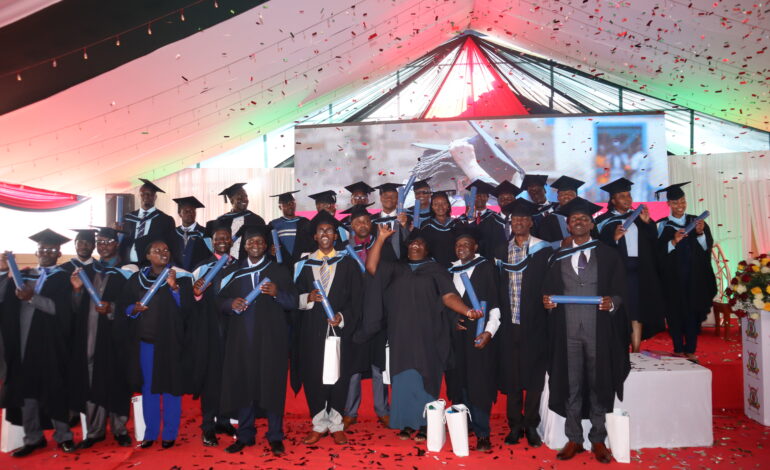Kenyan Convicts Turned Law Graduates

Behind the fierce unshaken high walls of Kamiti Maximum Prison, where the most dangerous convicts are detained, achieving dreams seems like a distant illusion. However, a groundbreaking event held on Tuesday, November 26, proved otherwise.
 This extraordinary ceremony unfolded under the beautifully erected tents on the prison grounds, leaving attendees inspired and moved. The occasion celebrated 29 graduates from the University of London’s Law program. Among them were 11 inmates, six ex-convicts, and 12 prison officers.
This extraordinary ceremony unfolded under the beautifully erected tents on the prison grounds, leaving attendees inspired and moved. The occasion celebrated 29 graduates from the University of London’s Law program. Among them were 11 inmates, six ex-convicts, and 12 prison officers.
Among the graduates was Ruth Kamande, famously known as “Miss Lang’ata,” who made headlines in 2015 when she was sentenced to death for stabbing her boyfriend 25 times. Today, she is celebrated as a law graduate.
“I remember how all hope in me got shuttered when I was sent to the gallows,” Ruth recalls while reading out her graduation speech. “I told Mr Alexander that I did not want to be a paralegal anymore because I did not see the need to be one while serving in the gallows. But today, I stand here with renewed purpose.”
This remarkable achievement was made possible through the efforts of Justice Defenders, an organisation that collaborates with the University of London and the Kenya Prisons Service (KPS) to provide legal education to inmates.
“We are a community of unlikely allies. Some of us have killed, raped, while others have been wrongly accused. We believe that we can use the law to serve those on the margins of society. Today is a day to say thank you. We are grateful to our partners for accepting us. We know we can be a very awkward group to deal with, but you still see us,” said the CEO and Founder of Justice Defenders, Alexander McLean.
In his speech, McLean quoted Martin Luther King Jr: “We can’t have justice without peace and we can’t have peace without justice,” while echoing the core mandate of Justice Defenders- creating a world where every accused person tells their side of the story before they are convicted.
Maximum-security prison convicts are often deemed irredeemable, problematic, and unfit for interaction with the public. However, as the graduates sat patiently awaiting recognition as law degree holders, a different picture emerged. The transformative and restorative power of the law program was vividly evident, challenging stereotypes and showcasing the profound potential for change.
Patricia McKeller, Dean of Undergraduate Laws at the University of London, commended the graduates for their resilience and commitment.
“It is not easy, especially in your environment, but you have shown commitment. Carry the lessons you have learnt and the friendships you have made. You mirror a whole new generation. Congratulations,” she said.
The journey to attaining a law degree is universally known as rigorous. For these graduates, particularly those studying behind bars, the challenges were immense and studying the law that put you behind bars did not make it easy.
As Ruth concluded her speech, she delivered a heartfelt appeal: “To our guests, we would love you not to just see us as criminals, but as inmates striving to become better people.”
She and other graduates from various prisons are living proof that prison, or even worse, a death row sentence, does not mean the end of life. The mind cannot be imprisoned even if the body is in confinement. They prove that redemption and transformation are possible.







